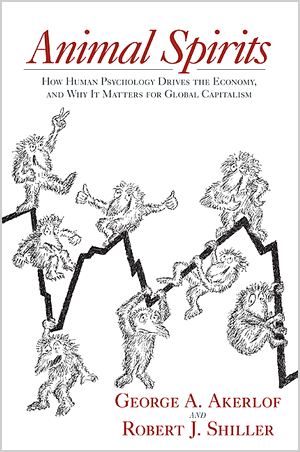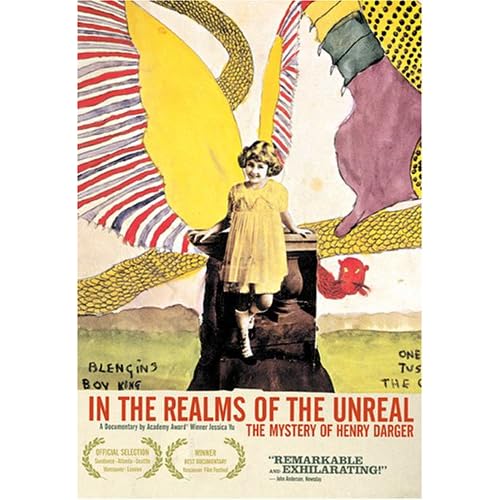 Animal Spirits, How Human Psychology Drives the Economy, and Why It Matters for Global Capitalism by George A. Akerlof and Robert J. Shiller.
Animal Spirits, How Human Psychology Drives the Economy, and Why It Matters for Global Capitalism by George A. Akerlof and Robert J. Shiller.I read recently that 40% of Americans do not believe in Darwin’s theory of natural selection. What strikes me about this percentage is that I worry it is too low if one considers how many Americans have a clue what the theory of natural selection is about, or how it relates to their daily lives.
In short, many people are oblivious to the notion if they came from a little seed of god’s inspiration or were raised up from an ape. We can well afford to live out our lives oblivious to any forms of thinking, scientific or otherwise, that attempts to describe an accurate model of how life happens. Though, sadly, it is not quite the case with economic theory that people can choose to happily live out their lives in an illusion, or to simply ignore what is going on and to let other ‘intelligent’ people lead the way. [It was commented to me in discussion about this review how odd an idea that humans can continue to have sex and procreate while being totally ignorant of the immediate consequences in there being the sudden appearance of babies that oddly look like them. When you think of it ignorance may be a factor in natural selection as in how many people, myself included, are born out of a sort of, "Gosh, I did not know that was going to happen," scenario. It was also pointed out to me, and it is one of my own conclusions, that nobody, and I mean nobody, understands the economy -- the danger to an individual's survival, I surmise, is to believe that there is anyone that does know what they are talking about, any more than to actually believe the weather person on the TV.]
Short sighted thinking, dysfunctional economic models, economics derived from divine cause (hidden hands with no strings attached, but also with bottles of snake oil offered) have very immediate and direct impacts on if people are able to sustain themselves, find employment, and survive. Bad models, shortsighted and narrowly conceived models very quickly have an impact when they drive the actions of politicians, the blathering of news media pundits, the advice of think tanks, actions of financial institutions, and the heated up enthusiasm of speculators in bubbles. When we hear all of these stories what do we think? Go buy more duct tape? [And in other comments it was reflected that humans cycle through bubbles faster and larger each time until there is a really big war. In the war enough people are killed off to reduce the memory of what -- bubbles can do for you -- and the expansive cycle of ever larger growing bubbles with a renewed sense of ignorance continues anew.]
What Akerlof and Shiller point out in this reasonably thin book is that the prevailing theories of economics, as both understood in academia and in politics, particularly in conservative politics, have been designed to eliminate factors of confidence, fairness, corruption, money illusion and stories.
How this plays out I will not go into here, you can read the book and decide for yourself.
I am not an economist; I am an independent capitalist, a small business owner that knows more about playing with the repair of stone walls than I know about economic theory. I am also a writer, and I enjoy stories. I have as much interest as anyone currently seeking work, wanting to pay the bills and pursue the American Dream, to understand how we got into the current economic mess. I am like the patient who with a good deal of skepticism questions the decisions of my doctor and does not accept that the medications they have me on might not in reality be killing me faster, as did once occur to a good friend who was quickly on his way out until he got better medical advice. If we look around we can easily begin to wonder if America is on the way out. It hardly matters what our political persuasion is for us to imagine that things are a bit messed up.
One aspect of the contemporary economic models and a strong reason for not accepting animal spirits (a term in economic theory propagated by Keynes) is the tendency toward simplification of models of understanding for the fact that if they are too complicated then very few people can understand them. It seems that economists at one point felt that they were being too wishy-washy and in fear that they may not be taken seriously they had a need to clean up their act to be more scientific and in the process of objectification they pro-actively threw out all the messy parts. In some respects it would be the equivalent of biologists who would say, “Well, there are too many genes and if we count them we will confuse more people.”
I have often been accused of making things complicated. I used to worry about this until one day it occurred to me that it is not me making anything complicated, it is me seeing that what is going on around us is complicated, and my reporting back on it just sounds complicated. To see complications is not a blessing, particularly when one is surrounded by simple minded people. So my not being an economist, but my being very intent as an independent capitalist, I want as much profit out of my daily efforts as I can possibly manage, I found that Akerlof and Shiller in their description of confidence, fairness, corruption, money illusion and stories do lay out a model of economic behavior that pretty well matches what I had previously thought was what is going on. [Though keep in mind that when I say nobody knows what they are talking about that the set of 'nobody' includes me.]
I will end with a small example of money illusion. For many years it was a common belief in the industry and the market in NYC for the cut out and repoint of a mortar joint in brickwork that the cost per square foot should be $12.00. At one time this cost may have been related to actual cost of labor, as cutting out mortar joints is mostly a product of labor with a small portion of material cost. Labor can do a good job of it, or they can do a really sloppy job. Technology, in moving from chisel and hammer to diamond-blade grinders changed a few of the cost parameters. What did not change was the perception that it should cost $12.00 per square foot. This $12.00 may seem like a small issue, but there is scale involved as in the NYC built environment there are millions and millions of square feet of masonry joints cut and repointed every year. For more than a decade if a contractor listed on a bid sheet a unit cost for repointing higher than $12.00 then the client would consider that all of their bid, which could be for a whole lot of work other than repointing alone, must be over-priced. If one were under in their unit cost then they may be considered either a bargain, or if too far under incompetent as shown by their not knowing what the work should cost (I mean, the illusion of what it should cost). The cost of labor rose considerably, a lot of that having to do with an increase in insurance cost and very little do with an increase in wages. Smart contractors either buried the increased cost and disguised their true cost for repointing in a $12.00 unit cost, or they learned to talk their clients (tell a story) into understanding why a square foot of repointing should cost $15.00, or in real radical instances, $25.00. In the end it all comes down to the story.
Note: From here I have gone on to reading The Protestant Ethic and the "Spirit" of Capitalism by Max Weber (1904). I may or may not make a future post of my thoughts on this entertaining book. Suffice it to say that I find it curious that one of the more virulent objections against early Methodists was not directly their religious views but that they worked more diligently than those of other faiths, sort of like the stories of the new union worker that soon learns to 'slow down' otherwise they skew the boss-man's expectations of production, well, the Methodists were not ones to slow down. Our current Secretary of State was brought up as a Methodist.



